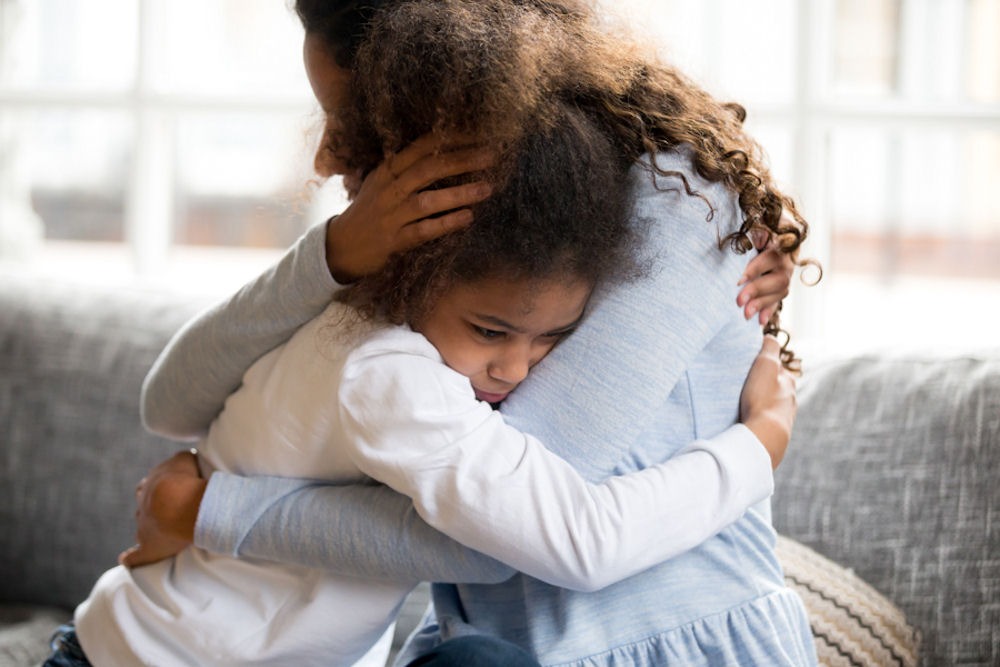Talking to a child about a parent’s addiction can be one of the hardest conversations to ever have. You might worry about saying the wrong thing or sharing too much information. Many parents and caregivers wonder how to protect a child’s feelings while still being honest about what’s happening at home, especially when there’s a risk the child may bring up the addiction to a loved one.
Children of addicted parents often know something is wrong, even when adults try to hide it. Without clear information, kids might make up their own explanations or blame themselves for their parent’s behavior. At First Steps Recovery, we’ve seen how honest, caring conversations can help families heal and move forward together.
What is Addiction?
Addiction is a chronic disease that can make it extremely hard for someone to stop using drugs, even when they want to quit. The National Institute on Drug Abuse defines addiction as a chronic disorder that changes how the brain works.
When someone has an addiction, their brain chemistry actually changes to accommodate for the substance the person’s consuming. Eventually, they feel like they need the substance to function normally.
Having an addiction is not about being weak or making bad choices. It’s a medical condition that requires substance abuse treatment, just like diabetes or heart disease. You wouldn’t label someone as being of poor moral character for having a broken bone, and you wouldn’t expect them to heal without medical help. Addiction works the same way.
Why Talk to a Child About Addiction?
According to SAMHSA’s 2022 National Survey, about 1 in 8 children live with at least one parent who has a substance use disorder. That means millions of kids are dealing with this situation right now.
Honest conversations about substance abuse with kids can help in several important ways:
- Reduces confusion: Kids often notice changes in behavior or mood, and honest explanations help them understand what’s happening
- Prevents self-blame: Children frequently think their parent’s addiction is somehow their fault. Knowing the true reasoning behind their parent’s actions can help prevent this from occurring.
- Builds trust: Being truthful strengthens your relationship with the child.
- Provides stability: Clear information can help kids feel more secure during uncertain times.
When children of addicts get age-appropriate explanations, they’re better equipped to cope with the situation and ask for help when they need it.
How Does Parental Addiction Affect Children?

Recent research shows that parental drug abuse affects children differently depending on their age. A child of an addicted parent might show various signs of stress or confusion.
- Young children (ages 3-6): The children often become clingy, have more tantrums, or start acting younger than their age. They might have trouble sleeping or eating.
- School-age kids (ages 7-12): A child this age will frequently struggle with schoolwork, withdraw from friends, or feel embarrassed about their home situation. They might worry about their parent to an extreme degree.
- Teenagers: Older children often feel angry, ashamed, or responsible for fixing the problem of their parents’ addiction. Some teens start taking risks or acting out, while others become overly responsible and try to take care of everyone else.
It’s important to remember that not all children react the same way to addiction. Some kids are very resilient and handle the situation well, especially when they have support from other caring adults.
Talking to Young Children (Ages 3-6)
Young kids understand simple, concrete explanations best. You can say something like “Mommy is sick and getting help from doctors” or “Daddy’s brain isn’t working right, so he takes medicine that makes him act differently.”
Use familiar comparisons to help them understand. For example: “You know how you feel sick sometimes and need medicine? Daddy’s brain feels sick, and the medicine he takes doesn’t help him get better.”
When parental drug abuse affects very young children, they mainly need to know:
- They are safe and loved
- The situation isn’t their fault
- Adults are working to make things better
Keep explanations short and be ready to repeat them. Young children often need to hear the same information multiple times before they understand it.
Talking to School-Age Children (Ages 7-12)
Kids this age can handle more detailed explanations about addiction as a disease. You might start by asking, “Have you noticed that Mom has been acting differently? Do you have questions about that?”
Explain that addiction inherently makes it very hard for people to stop using substances, even when they want to stop. You can compare it to other medical conditions, like needing glasses to see clearly.
Drug addiction can bring up specific concerns for school-age children:
- Will my parent die from the addiction?
- Is it my fault?
- Will I get addicted, too?
- What do I tell my friends?
Answer their questions honestly but reassuringly. Let them know that addiction runs in families sometimes, but it doesn’t guarantee that they’ll have problems with substances.
Talking to Teenagers
Teens often appreciate direct, honest conversations that acknowledge their feelings. They might already know quite a bit about addiction from school or friends. This opens up possibilities of more detailed discussions.
Address their concerns about genetics by explaining that while addiction can run in families, it’s not guaranteed to happen to a child of an addict. Many factors influence whether or not someone develops an addiction.
Teenagers dealing with parents with drug addiction often worry about:
- What their friends will think
- Whether they can fully trust their parent
- How this could affect their future
- Whether they’re at higher risk for addiction
Validate their feelings and let them know it’s normal to feel angry, embarrassed, or worried. Consider connecting them with support groups specifically designed for teens affected by family addiction.
What to Do When a Child Won’t Talk About Addiction
Some children aren’t ready or willing to discuss their parent’s addiction. This is completely normal and doesn’t mean you’ve done anything wrong.
Try these approaches when children of addicts aren’t ready to talk:
- Use art, drawing, or play to help them express feelings.
- Read age-appropriate books about addiction together.
- Watch for nonverbal signs they’re struggling, such as becoming inconsistent with grooming or eating meals.
- Give them space, but let them know you’re available to talk.
Signs a child might be struggling may include changes in sleep or eating patterns, withdrawing from friends, declining grades, or behavioral problems at school.
Just like learning how to talk with an addict requires patience and the right approach, helping children communicate about their experiences takes time and understanding.
Creating Stability During Difficult Times
Children of addicted parents often live with unpredictability. Creating stable routines helps them feel more secure when other parts of their life feel chaotic.
As a responsible adult in the child’s life, there are numerous ways you can support this effort:
- Maintain consistent daily routines: Regular meal times, bedtimes, and school attendance provide structure. Even small routines like reading together or having a snack at a certain time can create stability.
- Help them build a support network: Identify trusted adults who can help, such as teachers, relatives, family friends, or counselors. These people can provide additional stability and support when the addicted parent isn’t available, and may reduce the chances of the child developing codependence with the addicted parent.
- Set appropriate boundaries: Children shouldn’t be responsible for taking care of their addicted parent or managing an adult’s problems. Make sure kids have the room to just be kids, not miniature adults.
When to Seek Professional Help

Sometimes families need additional support beyond what friends and family can provide. Consider reaching out for professional help if a child shows persistent changes in behavior, declining school performance, or signs of developing depression or an anxiety disorder that may benefit from anxiety therapy.
Support groups like Al-Anon and Alateen provide peer support for family members affected by addiction. The National Association for Children of Addiction also offers resources specifically designed for children of addicts. At First Steps Recovery, we offer specialized family programs that help children understand addiction and develop healthy coping skills. Our counselors work with families to improve communication and rebuild trust.
Get Support for Addiction at First Steps Recovery
Talking to a child about addiction isn’t a one-time conversation. It’s an ongoing dialogue that evolves as they grow and understand more about the situation. Recovery is possible for families affected by addiction. Honest communication, professional support, and patience all help families to heal and build stronger relationships.
At First Steps Recovery, our comprehensive family support services address the unique challenges that children of addicted parents face. Our experienced counselors understand the unique challenges families face when dealing with addiction. Contact us today to learn more about our comprehensive family support services.
References:
Dr. Belis Aladag is a board-certified physician in Addiction Medicine and Family Medicine, with a Master of Public Health from Johns Hopkins. She brings more than 15 years of experience in clinical care, medical education, and leadership. Recognized as a “Top Doctor” in Sacramento Magazine and Los Angeles Magazine, Dr. Aladag is dedicated to compassionate, evidence-based care and expanding access to mental health and addiction services.





